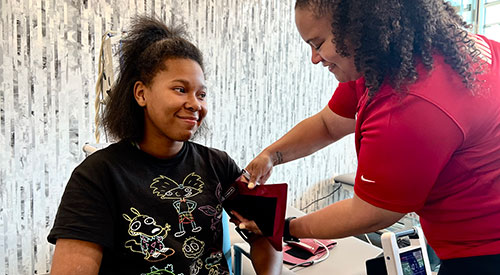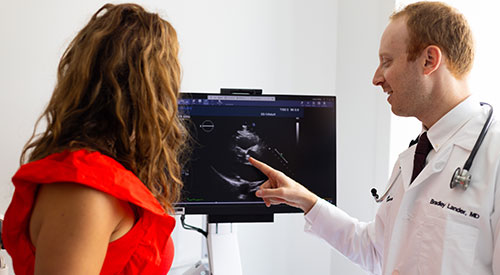Sports Cardiology: The Heart of an Athlete
Sports Cardiology at University Hospitals Harrington Heart & Vascular Institute offers comprehensive and timely cardiovascular care and testing for active individuals – from avid recreational exercisers to professional athletes.
Make an Appointment
To make an appointment or refer a patient, call 216-844-3800.
Specialized Treatment of Heart Disease in Athletes
Athletes can develop unique cardiovascular adaptations to exercise and cardiovascular symptoms that differ from those experienced by non-athletes. Additionally, they often require specialized treatment and expertise to return to activity or confirm eligibility for participation in their sport. The experts in Sports Cardiology work individually with patients to help athletes maintain or regain their desired level of activity and performance in a safe and evidence-based manner.
What Types of Athletes Do We See?
Our talented sports cardiology specialists evaluate and care for all types of athletes, including:
- All competitive athletes age 16+ (high school, club, collegiate, etc.)
- Professional athletes
- Elite athletes: Athletes who display potential for competing in the Olympics or at the professional level.
- Masters athletes: Competitive athletes age 35+
- Tactical athletes: Individuals in service occupations who work in dangerous and physically demanding environments. Tactical athletes include firefighters, police officers, emergency responders and military service members.
- Recreational athletes: People who want to improve or maintain their health by staying active. These athletes include “weekend warriors” and those looking to start more serious exercise regimens.
Our Expertise & Services
Evaluation of Athletes With Symptoms Suggestive of Cardiovascular Disease
We evaluate athletes and highly active people who experience physical symptoms during or after exercise that may have a cardiovascular cause, such as:
- Chest pain
- Lightheadedness
- Palpitations
- Frequent or prolonged shortness of breath
- Fainting (syncope)
- Unexplained decrease in athletic performance
Management of Athletes With Known and Unknown Cardiovascular Conditions
Our program includes diagnosis, management, and treatment of all types of cardiovascular conditions in athletes, including:
Arrhythmogenic right ventricular cardiomyopathy
Arrhythmogenic right ventricular cardiomyopathy (ARVC) is an inherited heart disease in which the heart muscle (myocardium) is replaced by both scar tissue (fibrosis) and fat tissue. ARVC occurs if the myocardium of the right ventricle develops scar tissue. This condition can disrupt the heart's electrical system to cause potentially life-threatening irregular heart rhythms (arrhythmias).
Coronary anomalies
The coronary arteries supply blood to the heart muscle. A coronary artery anomaly (CAA) is a form of coronary artery disease in which a congenital (existing at birth) or acquired malformation is present of one or both of the two primary coronary arteries. CAAs can potentially deprive the heart of oxygen and nutrients while causing serious side effects and even death. Though relatively uncommon, congenital coronary anomalies are one of the leading causes of sudden cardiac death (SCD) in people younger than 35 years of age.
Heart valve disorders
Heart valve disease occurs when one or more of the four valves in the heart is unable to function properly.
Hypertrophic cardiomyopathy
Hypertrophic cardiomyopathy (HCM) is a condition in which the muscle of the heart’s main pumping chamber (the left ventricle) grows abnormally thick (hypertrophy). The disease can shrink the size of the pumping chamber and make the heart become stiff. There may be obstruction to the blood flowing out of the heart, which can cause symptoms such as chest pain or pressure, shortness of breath with exertion, or passing out. A heart affected by HCM has to work harder than normal and may not be able to pump a sufficient amount of oxygen-rich blood to the rest of the body.
Inherited arrhythmias
Arrhythmias are abnormal heart rhythms that occur when the electrical signals that regulate the heartbeat do not work correctly, causing the heart to beat too fast, too slow or irregularly. When an arrhythmia is associated with a genetic condition that is passed down through families it is known as an inherited or familial arrhythmia.
Long QT syndrome (LQTS)
Long QT syndrome (LQTS) is a congenital (existing at birth) disorder in which the bottom pumping chambers of the heart can cause a dangerously rapid heartrate and irregular heart rhythms.
Wolff-Parkinson White (WPW) Syndrome
Wolff-Parkinson-White (WPW) syndrome is a congenital (existing at birth) heart defect where an extra signaling pathway between the heart’s upper and lower chambers causes a fast heartbeat (tachycardia).
Aortic dilation
The body’s main artery is the aorta. Aortic dilation is a condition in which part of the aorta becomes enlarged. If left untreated, the condition can lead to a number of complications, including aortic aneurysm, aortic rupture, aortic dissection and heart failure.
Other Reasons to Visit Sports Cardiology
- Family history of sudden death
- Abnormal sports pre-participation screening
- Decline in exercise performance
We also refer patients to other subspecialized physicians or cardiologists when needed, including interventional cardiologists, electrophysiologists, congenital heart disease specialists, vascular medicine specialists, cardiac surgeons and pulmonologists.
Sports Eligibility
For athletes with a known cardiac condition or a family history of a genetic cardiac condition, many high school and collegiate athletic programs require a cardiac screening assessment. This pre-participation testing is intended to risk-stratify athletes with known and unknown heart conditions. The process may minimize the risk of experiencing cardiac events or sudden death associated with exercise, shorten delays in returning to play, and help prevent unnecessary disqualifications from competition.
“Athlete’s Heart” Vs. Cardiovascular Disease: Knowing the Difference
“Athlete’s Heart,” also known as athletic heart syndrome and exercise-induced cardiac remodeling, refers to the structural, electrical and functional changes to the heart and vascular system as a result of long standing exposure to intense exercise. These changes are normal in that they reflect natural changes that enhance the heart’s ability to supply blood and oxygen to tissues during intense and prolonged exercise. For example, the heart of someone who engages in intense exercise for five hours or more per week may become slightly larger and more efficient than the average heart.
Athlete’s Heart is not a disease. As such, no major treatment is needed if you are diagnosed with the condition. However, it is important to distinguish between a healthy cardiovascular system changed by exercise and one that is structurally abnormal from a serious cardiovascular disease. The experts in Sports Cardiology are specially trained to recognize this difference.
What to Expect at Your Appointment

Before your appointment:
A member of our team will work with you to get your medical records and tests ahead of time for review at your appointment. These records includes notes from other doctors who may have referred you to Sports Cardiology as well as discs with images (echocardiograms, X-rays, MRIs and CT scans). Please have this information ready when you call to make an appointment.

During your appointment:
A sports cardiologist will see you to review your medical records, current health and symptoms; perform a physical exam; and provide a comprehensive and individualized plan that may include further testing and treatment.

After your appointment:
You will be scheduled for any additional necessary testing or treatment-related appointments, as well as routine follow-up visits with Sports Cardiology.
State-of-the-Art Diagnostics, Screening & Monitoring
In Sports Cardiology, we use the latest technologies to evaluate each patient’s cardiovascular health, including advanced imaging techniques. We also utilize specialized tools to monitor and assess the heart during exercise, such as cardiopulmonary exercise testing (CPET) and stress testing.
Heart evaluation technologies and tests we use include:
- Electrocardiogram (ECG)
- Echocardiogram (echo)
- Cardiac magnetic resonance imaging (MRI)
- Cardiac computed tomography (CT)
- CPET and stress testing
- Cardiac rhythm monitoring
- Laboratory testing
- Genetic testing
Multidisciplinary Care for Athletes With Heart Disease
To provide the best care possible, the clinicians working within Sports Cardiology collaborate with multiple medical disciplines across the UH system. Patients treated by Sports Cardiology have access to specialists in cardiac imaging, cardiac surgery, electrophysiology and interventional cardiology. They also works with physicians in sports medicine, orthopedics, physical medicine and rehabilitation, neurology and pulmonology to deliver interdisciplinary care tailored to each patient’s needs.
Why Choose UH Sports Cardiology?
UH Harrington Heart & Vascular Institute's Sports Cardiology department is supported by the full resources of University Hospitals, including its large, nationally renowned academic medical center, 18 satellite hospitals, 40 health centers and dozens of medical practices – all collaborating to serve 1 million people throughout Northeast Ohio.
UH Harrington Heart & Vascular Institute offers many options for close-to-home cardiovascular care, with multiple locations throughout Northern Ohio. Ongoing investment in our local facilities ensures that we have the latest tools and therapies available to deliver the best personalized cardiovascular care for patients where and when they need it most.
Sports Cardiology also operates in close collaboration with University Hospitals Drusinsky Sports Medicine Institute, which opened in 2023 and is a state-of-the-art facility dedicated to the care of athletes and highly active individuals.
Program Leadership
Director of Sports Cardiology
Second Opinion
Our team welcomes appointments for second opinions to review cases and suggested treatment plans. Please have records from initial opinions available for review.
Call the Sports Cardiology team at 216-844-3800 to make an appointment.
Sports Partnerships
UH Drusinsky Sports Medicine Institute provides medical coverage for athletes of all ages and levels of competition. Through its various partnerships, the institute serves as the Official Healthcare Provider of the Cleveland Browns and on the sidelines of over 50 colleges, high schools and youth organizations across northeast Ohio.
Make an Appointment
Patients and referring physicians: Please call the Sports Cardiology team at 216-844-3800. We take care to communicate directly with referring physicians, teams and organizations to discuss diagnosis and treatment recommendations.


